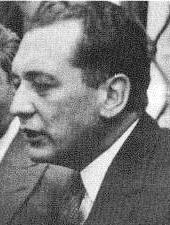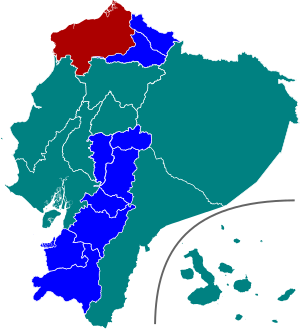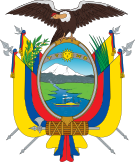The Liberal Party of Cuba, was one of the major political parties in Cuba from 1910 until the Cuban Revolution in the late 1950s, when it was exiled.

General elections were held in the Netherlands on 7 July 1948. The Catholic People's Party remained the largest party in the House of Representatives, winning 32 of the 100 seats.

Constitutional Assembly elections were held in South Korea on 10 May 1948. They were held under the U.S. military occupation, with supervision from the United Nations, and resulted in a victory for the National Association for the Rapid Realisation of Korean Independence, which won 55 of the 200 seats, although 85 were held by independents. Voter turnout was 95%.

General elections were held in Sweden on 19 September 1948. Despite a campaign by a large part of the Swedish press against socializing insurances, controlled foreign trade and rationing regulations still in use since the war, freshman Prime Minister and Social Democratic leader Tage Erlander managed to defeat the People's Party-led opposition under Bertil Ohlin by a higher election turnout. He maintained his government with only minor losses and the Swedish Social Democratic Party remained the largest party, winning 112 of the 230 seats in the Andra kammaren of the Riksdag. Erlander was to stay on as Prime Minister until 1969.
Parliamentary elections were held in Czechoslovakia on 26 May 1946. The Communist Party of Czechoslovakia emerged as the largest party, winning 114 of the 300 seats with 38% of the vote. The Communist vote share was higher than any party had ever achieved in a Czechoslovak parliamentary election; previously, no party had ever won more than 25%. Voter turnout was 94%. The national results also determined the composition of the Slovak National Council and local committees.

Folketing elections were held in Denmark on 28 October 1947, except in the Faroe Islands where they were held on 18 February 1948. The Social Democratic Party remained the largest in the Folketing, with 57 of the 150 seats. Voter turnout was 86% in Denmark proper and 60% in the Faroes.

Folketing elections were held in Denmark on 5 September 1950, except in the Faroe Islands where they were held on 14 October. The Social Democratic Party remained the largest in the Folketing, with 59 of the 151 seats. Voter turnout was 82% in Denmark proper but just 22% in the Faroes.
Partial general elections were held in Luxembourg on 6 June 1948, electing 26 of the 51 seats in the Chamber of Deputies in the centre and north of the country. The Christian Social People's Party won 9 of the 26 seats, reducing its total number of seats from 25 to 22.

General elections were held in Honduras on 10 October 1948. The elections were boycotted by the Liberal Party as the party was restricted from campaigning. Instead, they called for the electorate to abstain from voting.

Constituent Assembly elections were held in Honduras on 26 January 1936.

The 1949 Philippine presidential and vice presidential elections were held on November 8, 1949. Incumbent President Elpidio Quirino won a full term as President of the Philippines after the death of President Manuel Roxas in 1948. His running mate, Senator Fernando Lopez, won as Vice President. Despite factions created in the administration party, Quirino won a satisfactory vote from the public. It was the only time in Philippine history where the duly elected president, vice president and senators all came from the same party, the Liberal Party. Carlos P. Romulo and Marvin M. Gray, publisher of the Manila Evening News, accuse Quirino in their book The Magsaysay Story of widespread fraud and intimidation of the opposition by military action, calling it the "dirty election".
Presidential, legislative, and local elections were held on November 8, 1949 in the Philippines. Incumbent President Elpidio Quirino won a full term as President of the Philippines after the death of late President Manuel Roxas in 1948. His running mate, Senator Fernando Lopez won as Vice President. Despite factions created in the administration party, Quirino won a satisfactory vote from the public. It was the only time in Philippine history where the duly elected president, vice president and senators all came from the same party, the Liberal Party.
General elections were held in Siam on 29 January 1948. Following the 1947 coup, the unicameral parliament elected in 1946 was abrogated. It was replaced by a bicameral parliament, with a 100-seat appointed Senate and a 99-member House of Representatives.

General elections were held in Costa Rica on 4 October 1949. They followed the introduction of a new constitution after the Costa Rican Civil War. Voters elected a Vice-President and the Legislative Assembly. The result was a victory for the National Unity Party, which received 72% of the vote. Voter turnout was 44% in the vice-presidential election and 49% in the parliamentary election.

General elections were held in Cuba on 1 June 1948. Carlos Prío Socarrás won the presidential election running under the Auténtico-Republican Alliance banner, whilst the Partido Auténtico emerged as the largest party in the House of Representatives, winning 29 of the 70 seats. Voter turnout was 78.7%.

General elections were held in Puerto Rico on 2 NovemberR 1948, which included the first-ever elections for the position of governor, who had previously been appointed by the President of the United States. Luis Muñoz Marín of the Popular Democratic Party won the gubernatorial elections with 61% of the vote, becoming the first ever popularly elected governor of Puerto Rico.
Constituent Assembly elections were held in Argentina on 5 December 1948. Peronistas dominated the election, winning 66% of the vote. Voter turnout was 74%.
A referendum on the sugar industry was held in Switzerland on 14 March 1948. Voters were asked whether they approved of a federal resolution on the reorganisation of the Swiss sugar industry. The proposal was rejected by 63.8% of voters.

Presidential elections were held in Colombia on 27 November 1949. The result was a victory for Laureano Gómez of the Conservative Party, who received all but 23 of the 1.1 million valid votes cast. The opposition Liberal Party withdrew from the election and called for a boycott after their candidate Darío Echandía was the victim of a failed assassination attempt.

Parliamentary elections were held in Chile on 6 March 1949. Although the Social Christian Conservative Party received the most votes in the Senate elections, the Liberal Party won the most seats, whilst the Radical Party remained the largest party in the Chamber of Deputies.
















